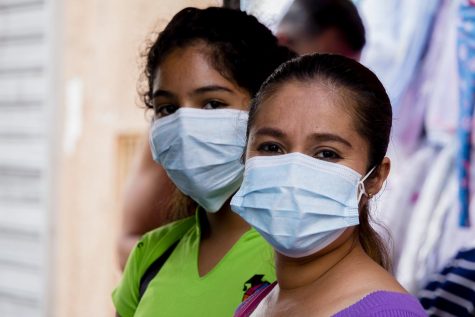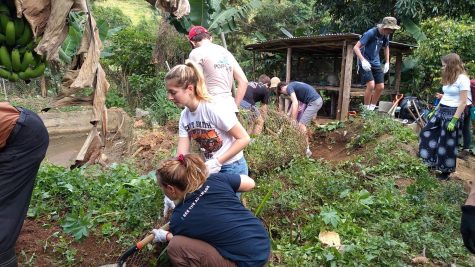Nuevas políticas de inmigración: la realidad para Marín
September 12, 2019
A medida que se acerca el otoño, reflexionamos sobre los cambios que la administración Trump ha traído a la inmigración este verano, y lo que significa para cientos de inmigrantes que viven en el condado de Marín. Aproximadamente 16 por ciento de la población en Marín son hispanos o latinos. Según Pew Research, esta porción de la población probablemente se verá afectada por las nuevas regulaciones y propuestas de la administración Trump, ya que aproximadamente 50 por ciento de todos los inmigrantes son de América Latina.
Katerin Herrera es una estudiante del décimo grado en la clase Desarrollo del Idioma Inglés (ELD) en Redwood, cuya familia es de El Salvador. Ha estado viviendo en Marín por aproximadamente un año y medio. Ella cree que de alguna manera, es comprensible por qué los estadounidenses desconfían de los inmigrantes debido a las altas tasas de criminalidad, pero podrían implementarse otros métodos para apuntar a los que son criminales.
“Hay personas que no merecen estar aquí porque son delincuentes, como las pandillas y algo así, pero también hay muchas personas aquí que no son esto. No se puede quitar el derecho de estar aquí a todos si no todos están haciendo estas cosas,” dijo Herrera.

Canal Alliance is a nonprofit organization that assists immigrants who are challenged by a lack of resources in an unfamiliar environment.
Las modificaciones de la administración Trump comenzaron en julio con la propuesta de cambiar lo que califica a una persona para recibir cupones de alimentos. Las calificaciones cambiaron de ser reguladas por estados individuales a controladas por el gobierno federal. Según el Banco de Alimentos de San Francisco-Marín, tales cambios afectarían áreas con altos costos de vida, como el Área de la Bahía, porque no toman en cuenta cuánto gasta la gente en vivienda. El Banco de Alimentos de San Francisco-Marín también dice que más de 1,000 de los residentes de Marín podrían perder el acceso a los cupones de alimentos si las nuevas propuestas se promulgan, muchos de ellos inmigrantes.
En agosto se produjeron más cambios cuando la administración Trump anunció el fin de la protección de los inmigrantes mientras ellos o sus familiares reciben tratamientos médicos que les salvan la vida. El 7 de agosto, según NBC News, los funcionarios de inmigración enviaron cartas a todas las personas que aplazaban la deportación por razones médicas, diciendo que tenían semanas para abandonar el país o ser obligados a hacerlo. Así, inmigrantes que se enfrentan a una enfermedad potencialmente mortal, dejarían de recibir tratamiento y los deportarían de inmediato si no se marchaban bajo sus propios términos. Sin embargo, después de una reacción violenta, el Servicio de Ciudadanía e Inmigración de EE. UU. retiró esta decisión y dijo que aún consideraría los casos pendientes que se presentaron antes del 7 de agosto. Todavía no está claro qué sucederá con los casos que no se presentaron para la renovación antes esta fecha.

Mónica Leifer es una madre de un estudiante en Redwood, inmigrante colombiana y la directora del Programa Bilingüe, un programa que comenzó a ayudar a los inmigrantes a trabajar en las escuelas como voluntarios. Ella se asocia con escuelas donde la población estudiantil es una gran parte hispana y ayuda a los inmigrantes a trabajar en aspectos de la escuela que harían que los estudiantes latinos se sientan más bienvenidos y representados. Leifer trabaja con inmigrantes indocumentados con frecuencia y le preocupa lo que pueda sucederles.
“Tienen miedo de lo que Trump pueda hacerles [y] de cómo se mantienen con la ley. Algunos de ellos que han comenzado los procesos de inmigración temen que el proceso se detenga o que las cosas compliquen el proceso ya insoportable de convertirse en ciudadanos legales,” dijo Leifer.
Además de todas estas alteraciones en la política, Trump propuso una modificación de inmigrantes de “carga pública” que se finalizó el 14 de agosto. Esto establece que los inmigrantes legales que usan beneficios como cupones de alimentos, Medicaid y asistencia de vivienda durante 12 meses de un período de 36 meses se etiquetará como una “carga pública” que pone en peligro su capacidad de obtener una tarjeta verde o convertirse en ciudadano. Aunque la propuesta de carga pública no afecta a menores, solicitantes de asilo o la mayoría de los residentes permanentes legales, está afectando a familias de bajos ingresos que ahora tienen miedo de solicitar dichos beneficios.
No está claro si estas nuevas regulaciones se implementarán por completo o cuándo, los cambios en las políticas ya están afectando a los inmigrantes, tanto directa como indirectamente.
Jaquelin Reyes es una estudiante del undécimo grado en la clase ELD en Redwood. Su familia es de Guatemala y se mudó a los Estados Unidos debido a todas las oportunidades que ofrece para tener mejores trabajos y educación. Reyes expresó su opinión sobre las nuevas políticas de inmigración y lo que se siente ser un inmigrante rodeado del odio que aparentemente está extendiendo la administración Trump.
“No es bueno lo que [Trump] está haciendo porque los inmigrantes, de donde venimos, trabajamos. La mayoría de nosotros aquí venimos a trabajar y mejorar nuestras vidas. Simplemente no hay las mismas posibilidades en otros países que hay aquí en Estados Unidos, es triste que seamos discriminados,” dijo Reyes.
English Version:
New immigration policies: the reality for Marin
As autumn approaches, we reflect on the changes the Trump administration has brought to immigration this summer and what that means for hundreds of immigrants living in Marin County. Roughly 16 percent of the population in Marin County is Hispanic or Latino. According to Pew Research, this portion of the population will likely be affected by the new regulations and proposals from the Trump administration, as roughly 50 percent of all immigrants are from Latin America.
Katerin Herrera is a sophomore in the English Language Development (ELD) class at Redwood. Her family is from El Salvador and has been living in Marin for about a year and a half. She believes that, in some ways, it is understandable why Americans are wary of immigrants due to high crime rates, but she thinks other methods could be put in place to target those who are criminals.
“There are people who do not deserve to be here because they are criminals, such as gangs, but there are also many people here who are not like this. You cannot take away the right to be here from everyone if not everyone is doing these things,” Herrera said.
The modifications introduced by the Trump administration this summer started in July with a proposal to change food stamp qualifications. The qualifications would change from being regulated by individual states to controlled by the federal government. According to the San Francisco-Marin Food Bank, changes would affect areas with high living costs, such as the Bay Area, because it does not take into consideration how much money people spend on housing. The San Francisco-Marin Food Bank also says that more than 1,000 of Marin’s residents could lose access to food stamps if the new proposals are put in place, many of those affected being immigrants.

More changes came in August when the Trump administration announced an end to the protection of immigrants while they or their relatives receive life-saving medical treatments. On Aug. 7, according to NBC News, immigration officials sent out letters to every individual deferring deportation for medical reasons saying they had weeks to leave the country or be forced to leave. Essentially, an immigrant who was faced with a life-threatening disease would stop receiving treatment and immediately be deported if they did not leave on their own terms. Because they were faced with backlash, the U.S. Citizenship and Immigration Service pulled back on this decision and said that it would still consider pending cases that were submitted before Aug. 7. It is still uncertain what will happen to cases that did not submit for renewal before this date.
Monica Leifer is a Redwood parent, Columbian immigrant, and the head of the Bilingual Program in Marin, a program she started to help immigrants work in schools as volunteers. She partners with schools where the student population is largely Hispanic and helps immigrants work in aspects of the school that would make Latino students feel more welcome and represented. Leifer works with illegal immigrants frequently and is worried about what might happen to them.
“They are scared of what Trump might do to them and where they stand with the law. Some of them that have started the immigration processes are afraid that the process will come to a halt or things will complicate the already excruciating process of becoming a legal citizen,” Leifer said.
In addition to all these policy alterations, Trump proposed a “public charge” immigrant modification which was finalized on Aug. 14. This proposal essentially states that legal immigrants who use benefits like food stamps, Medicaid and housing assistance for 12 months out of a 36 month period will be labeled as a “public charge,” which jeopardizes their ability to get a green card or become a citizen. Although the public charge proposal does not affect minors, asylum-seekers or most legal permanent residents, it is affecting low-income families who are now scared to apply for such benefits.
While it is uncertain if or when these new regulations will be fully implemented, policy changes are already affecting immigrants both directly and indirectly. Jaquelin Reyes is a junior currently in the ELD class at Redwood. She and her family are from Guatemala and moved to the United States because of all the opportunities it offers to build a better life. Reyes voiced her opinion on the new immigration policies and what it feels like to be an immigrant stereotyped by the changing attitudes towards Latinos.
“Well, it’s not good what [Trump] is doing. Where we came from, we worked. The majority of us here come to work and better our lives. There just aren’t the same possibilities in other countries that there are here in the U.S. and it’s sad that we are being discriminated against,” Reyes said.























